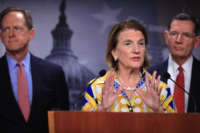
Republican-led legislatures in Arkansas, Florida, Georgia, Texas, and other states are passing laws that make it harder to vote. Many of these bills, which have been drafted with help from an offshoot of the conservative Heritage Foundation, will have a disproportionate impact on voters of color and are being challenged in court.
While judges could strike down some provisions for violating a state constitution or discriminating against voters with disabilities, the appellate courts that will make the final decision include mostly Republican appointees.
The GOP is defending the legislation as a response to voter fraud, though there is no evidence of widespread fraud. Jessica Anderson of Heritage Action, which helped with the drafting, said the bills would help “right the wrongs of November.” Heritage has long advocated voting restrictions, such as voter ID laws; as founder Paul Weyrich said in 1980, “Our leverage in the elections quite candidly goes up as the voting populace goes down.” The group has pledged to spend millions defending the new laws in court.
Voter suppression laws have faced difficulty passing the scrutiny of courts in recent years. For example, North Carolina’s 2013 voting law, which included a strict voter ID mandate, cuts to early voting, and the end of Election Day registration, was struck down by the 4th U.S. Circuit Court of Appeals in Virginia in 2016. The court found that legislators had targeted Black voters “with almost surgical precision.”
North Carolina went on to pass another voter ID law that was also blocked by a federal judge in late 2019. The 4th Circuit overturned that decision, but in February 2020 the state Court of Appeals blocked the law after finding it likely violated the state constitution by disenfranchising Black voters. The case went to trial last month. The North Carolina Supreme Court, which has the final say on state law, has a 4-3 Democratic majority, but Republicans could take control after next year’s election.
In Texas, Florida, and Georgia, the state supreme courts are composed entirely of Republican justices. Most of them are affiliated with the conservative Federalist Society, which helped both former President Donald Trump and Florida Gov. Ron DeSantis choose appointees.
Trump appointed more than a quarter of active federal judges, and last year his appointees shot down efforts to ease voting rules during the pandemic. The U.S. Supreme Court, which now has a 6-3 majority of Republican appointees including three put there by Trump, is unlikely to rule that the new Southern voter suppression laws discriminate against voters of color. In the run-up to last year’s election, the high court ruled against voters several times, including a ruling in favor of Alabama officials who were seeking to bar local election boards from offering curbside voting during the COVID-19 pandemic.
These judges are unlikely to rule that the new voter suppression bills are racially discriminatory, but some courts could strike them down for violating the state constitution or the Americans with Disabilities Act (ADA).
Citing the ADA in Georgia
Georgia’s new voting law incorporated several recommendations from Heritage, including strict limits on ballot drop boxes and mail-in ballot request forms, as well as bans on counties raising money from nonprofits for election administration. It also allows state officials to overturn decisions by local elections officials.
Civil rights groups immediately filed lawsuits challenging the new rules. A federal lawsuit from several voting rights groups argues the law will have a greater impact on voters of color, who face much longer wait times.
Any ruling to strike down the law would be reviewed by the 11th U.S. Circuit Court of Appeals, which hears cases from Florida, Georgia, and Alabama. Republicans have radically reshaped the court in recent years, and Trump’s appointees included lawyers who had defended voter suppression. For example, Judge Andrew Brasher in his previous role as Alabama’s solicitor general had filed a brief defending a Florida law that had been struck down as an unconstitutional “poll tax.” The court agreed and restored the restrictive Florida law.
Though federal courts probably won’t strike down the new Georgia voter suppression bill as racially discriminatory, the lawsuits argue that some provisions — including the ban on giving food and water to voters waiting in line — violate the ADA. The 11th Circuit previously issued groundbreaking rulings that broadly interpreted the ADA. But last year, in addition to upholding Alabama’s restrictions on curbside voting, the court ruled that a grocery store’s website wasn’t subject to the ADA.
The law could eventually face challenges in state court as well, because the Georgia Constitution includes strict limits on the legislature’s power. The state Supreme Court has had a conservative majority since the legislature packed the court in 2016. Six of the seven justices are Republican appointees.
Multiple Challenges in Florida
Gov. DeSantis signed a bill on May 3 that also bans giving food and water to waiting voters and sharply limits drop boxes for mail-in ballots. After last year’s election, DeSantis praised election administration in his state and held it up as a model. But the bill he signed makes big changes and was opposed by local election administrators.
The new law makes it nearly impossible for voter registration groups to help voters return their ballots, and it requires those groups to recite a misleading “warning” to people they help register to vote. Now election boards must post an employee to constantly monitor drop boxes, which can be open only during early voting hours.
Civil rights groups immediately filed multiple challenges against the law in federal court. They argued, among other things, that it violates the ADA by making voting inaccessible to many voters with limited mobility, who are more likely to use drop boxes that are “placed outdoors and are easily accessible.” One lawsuit argues the penalties for giving voters food and water “exposes family members, caregivers, and volunteers to potential criminal liability.”
Another federal lawsuit says the bill “purports to solve problems that do not exist” and “caters to a dangerous lie about the 2020 election that threatens our most basic democratic values.” It argues the bill was intended to keep senior citizens, young people, and voters of color from casting their ballots.
Like Georgia’s, Florida’s new voter suppression law would likely be reviewed by the conservative 11th Circuit. And any state case would be headed for the Florida Supreme Court, which is one of the most conservative courts in the country. All of the justices are Republican appointees.
A Pledge to Sue in Texas
The Texas House passed a bill on May 7 that bans election officials from sending out unsolicited mail-in ballot request forms, empowers partisan poll watchers, and creates criminal penalties for election officials who violate limits on helping voters. A similar measure had already passed the Senate and the bill is now being finalized in conference.
Republicans removed some of the bill’s more onerous restrictions last week, as well as controversial “purity of the ballot box” language that was added to the state constitution when white supremacist politicians established Jim Crow.
Democrats said they would sue over the law in federal court, but the 5th U.S. Circuit Court of Appeals, which hears cases from Louisiana, Mississippi, and Texas, is arguably the most conservative appellate court in the country. Trump’s appointees included Judge Kyle Duncan, who signed a brief defending the 2013 North Carolina voter suppression bill.
The 5th Circuit struck down a Texas voter ID law as violating the Voting Rights Act in 2016. But the court upheld a subsequent voter ID bill two years later. The court has also issued several rulings to throw out ADA lawsuits in recent years.
If the new law is challenged under the state constitution, the case would be tried in the state capital of Austin. Most of the judges there are Democrats, but the legislature is considering a bill that would take the decision out of the hands of Austin’s appellate judges. The bill would create a new appellate court, elected in statewide partisan races, to review rulings in cases challenging state laws.
In 2020, the all-GOP Texas Supreme Court sided with state officials seeking to block a county official from sending mail-in ballot request forms to all registered voters.
Arkansas Sued in State Court
Unlike in the other states, Arkansas’ legislature didn’t pass a single bill with multiple restrictions on voting rights. But it did pass a series of bills that included many of the same Heritage Foundation suggestions. Legislators also toughened Arkansas’ voter ID law and gave county commissioners authority over polling places. Holly Dixon of the state ACLU said this legislative session saw “the most dangerous assault on the right to vote since the Jim Crow era.”
The state League of Women Voters and Arkansas United, an immigrant advocacy group, challenged the bills in state court. The groups argue that the new voting restrictions violate the rights to equal protection, a “free and equal election,” and free speech guaranteed by the Arkansas Constitution.
Lawmakers defended the bills as a response to fraud. But the lawsuit argues that “if there is a threat to the integrity of Arkansas’s elections, it is the state’s consistently low voter turnout, particularly among Black voters.”
The Arkansas Supreme Court struck down a voter ID law in 2014, construing it as a new “qualification” for voters, beyond those laid out in the state constitution. In 2018, though, the court upheld a similar law.
Voters elected a conservative justice to the state Supreme Court last year, after a GOP group in Washington, D.C., spent big in the nonpartisan race. The new justice created a narrow conservative majority. Recent conservative high court candidates have been closely tied to the Republican Party.
A bill introduced in the Arkansas legislature in February would have shifted the state to partisan judicial races, a move that only one state — North Carolina — has made in the past century. However, that bill stalled in committee.
This post was originally published on Latest – Truthout.






 (@evanlweber)
(@evanlweber) 




















